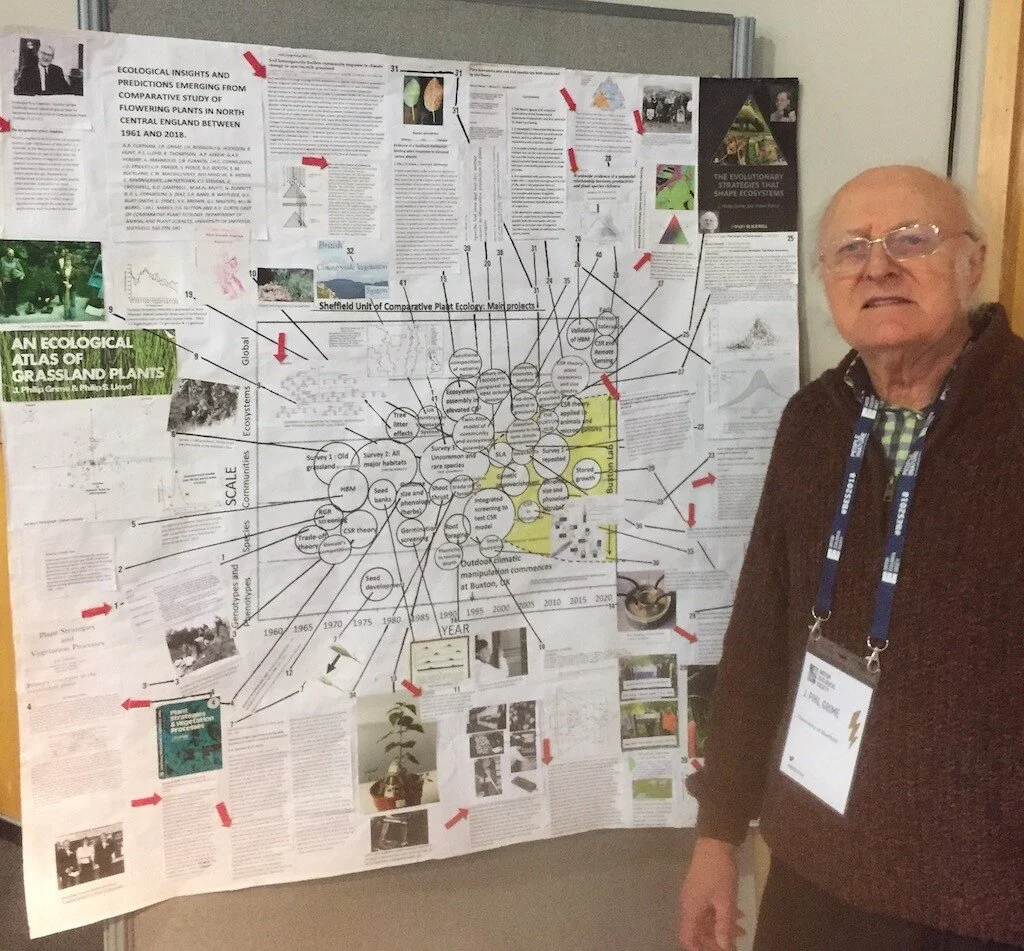phil grime (in argentina)
BCCIL long-term experiment in buxton, derbyshire
phil at the BES2018 annual meeting in BIRMINGHAM
THE PARK GRASS EXPERIMENT AT ROTHAMSTED RESEARCH IN HERTFORDSHIRE
GIVING A GUIDED TOUR OF THE BCCIL EXPERIMENT AT BUXTON TO ECT CONFERENCE DELEGATES IN 2019
Prof John Philip Grime FRS (hereafter Phil) was born on 30 April 1935, and died after a short illness on 19 April 2021. Apart from a short spell at Connecticut Agricultural Experiment Station, USA, in 1963-64, he spent his entire career at Sheffield University, much of it as Deputy Director, and later Director, of the NERC Unit of Comparative Plant Ecology (UCPE).
Phil will have been known to many of you as a great friend and supporter of the ECT, and as the creator and driving force behind the Buxton Climate Change Impacts Laboratory (BCCIL), the UK’s longest running climate change experiment. But BCCIL (pictured left) was just one example of Phil’s unique ability to see the ‘big picture’, whether that was spatially, with UCPE’s enormous vegetation survey of the Sheffield region, temporally, with BCCIL, or the Integrated Screening Programme (ISP), a standardised search for trait trade-offs on a massive scale. The ISP was the dawn, in retrospect, of the trait-based approach to plant ecology, something that now dominates much of the subject. Ultimately, all this work fed into and supported Phil’s original idea of three distinct, fundamental and essentially mutually incompatible avenues of evolutionary specialisation: competitors, stress-tolerators and ruderals (CSR).
Phil was an inspiring speaker. I always remember a member of an undergraduate tutorial group telling me, after attending a departmental seminar by Phil in the mid-2000s, that he now knew he wanted to do a PhD in plant ecology. He did indeed go on to do a PhD on the Park Grass Plots at Rothamsted (pictured left), later returning to Sheffield as a postdoc on several botanical projects.
How will history judge Phil’s work and impact? Positively I’m sure – the passage of time has only confirmed that CSR reflects fundamental truths about how the world works. The original CSR paper was published in Nature in 1974, and a glance at Web of Science shows that generations of ecologists who weren’t even born then are discovering CSR and applying it to everything from plant invasions and succession to the evolution of crop plants and the functioning of green roofs. He also personally collaborated with and inspired a generation of ecologists. Of course, not everyone agreed with him, and some of Phil’s arguments with critics are legendary. But that goes with the territory; Phil was a revolutionary who was passionate about his subject.
What about Phil the person – the very fine cricketer and lifelong Manchester City fan? Let me just say two things. One is that I’ve never known anyone less likely to set out deliberately to make another ecologist (however young or inexperienced) look stupid. Phil was always willing to listen patiently to questions and explain his point of view; he had time for everyone. The other thing is that however tedious, difficult or dirty the jobs that needed doing (and there were plenty at Buxton that were all three), Phil always led from the front; he didn’t expect anyone to do anything he wouldn’t do himself.
I’ll miss him a lot. We all will.
Additional Information
View our dedicated webpage for further information on the Buxton Climate Change Impacts Laboratory (BCCIL) which Phil established, now running continuously for 29 years.









